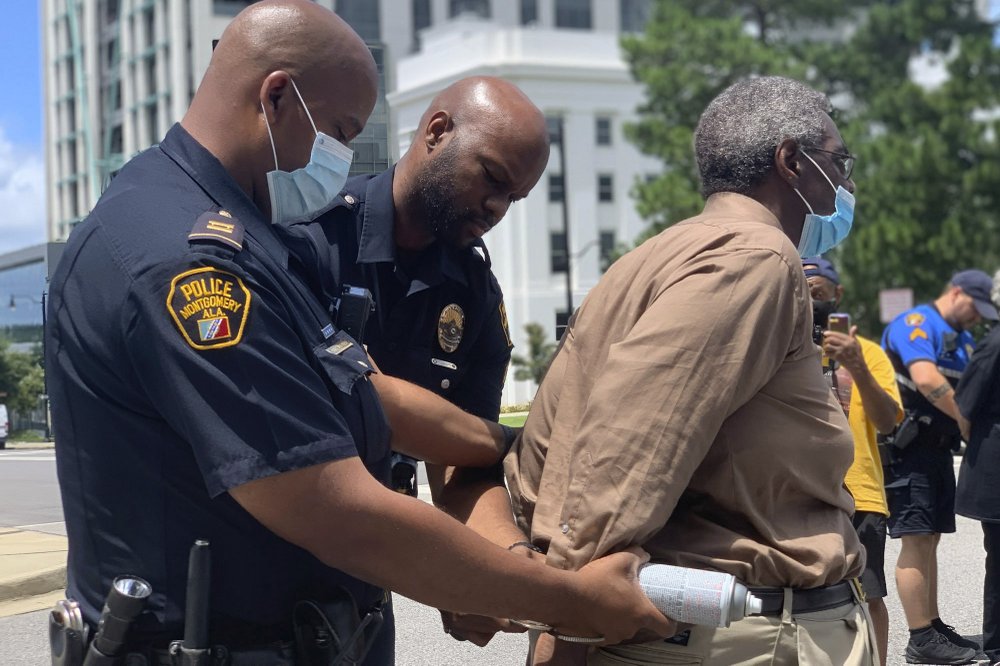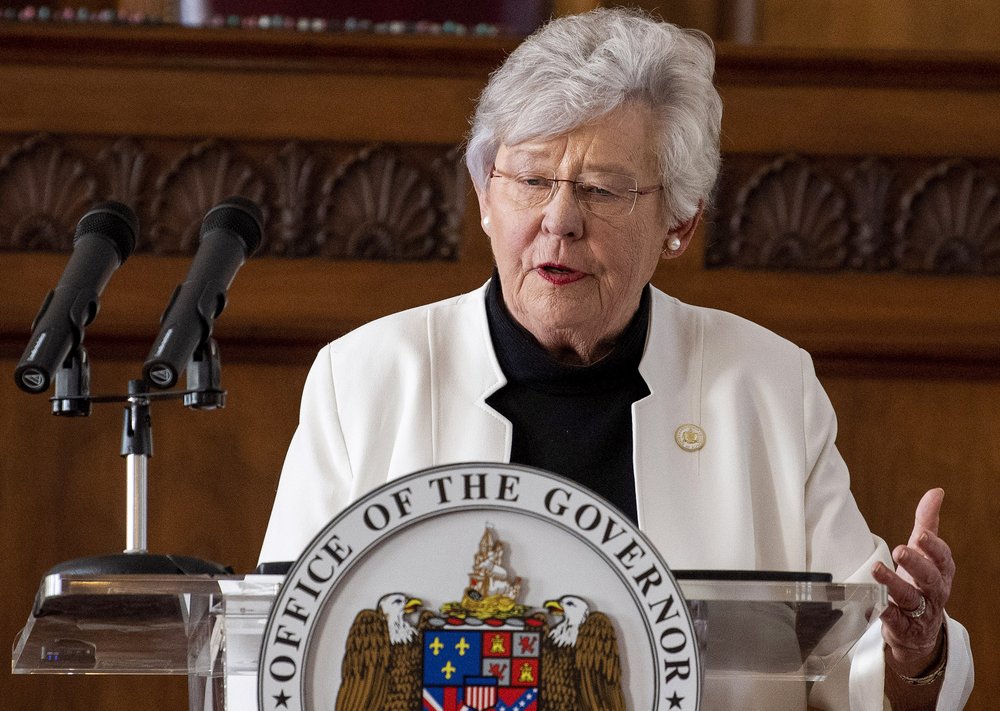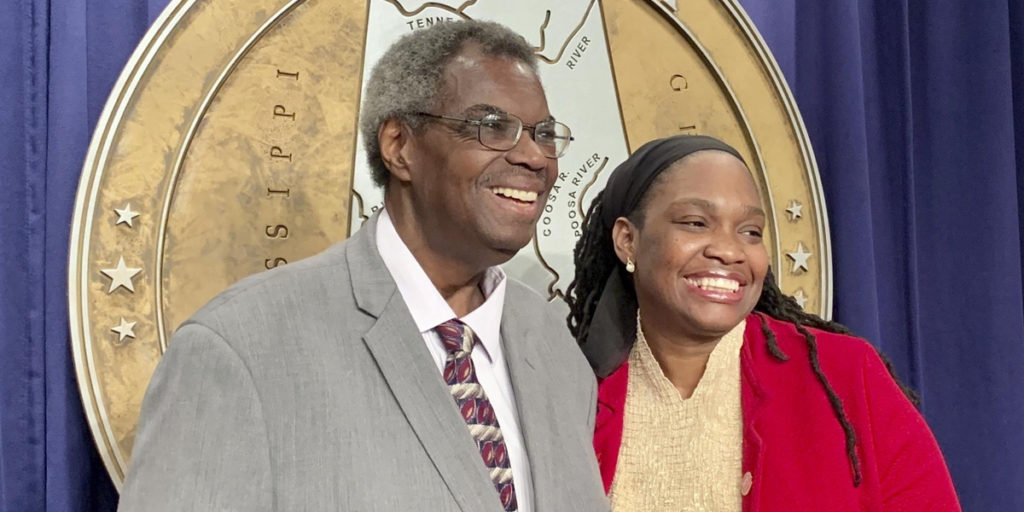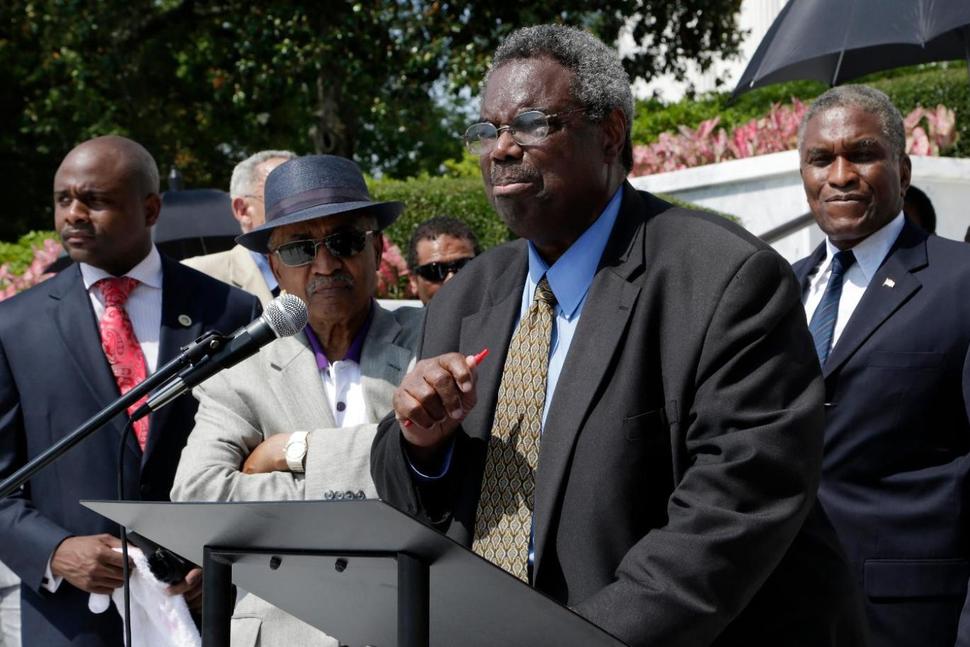Arrests at Alabama Capitol protest for Medicaid expansion

Several people, including a former longtime state senator, were arrested Tuesday for attempting to paint “Good Trouble” and “Expand Medicaid” on the street in front of the Alabama Capitol. Montgomery police swiftly handcuffed former Sen. Hank Sanders, 77, and at least five others as they began to write the words in yellow spray paint. A few others were arrested after they refused to move back onto the sidewalk. It was not immediately clear what they were being charged with. The painting and arrests followed a news conference by the Alabama Save OurSelves Movement for Justice and Democracy and other groups who have held periodic events urging Alabama Gov. Kay Ivey and legislators to expand the state’s Medicaid program. “We have to keep fighting. Right here in Alabama we are calling upon the governor once again to expand Medicaid. More than 300,000 Alabamians would benefit in terms of having affordable and accessible health care if she would expand Medicaid in this state,” said Johnny Ford. Alabama is one of about 13 states that have not approved the expansion of Medicaid under the Affordable Care Act, according to the Kaiser Family Foundation “Good Trouble” is a reference used by the late U.S. Rep. John Lewis for the arrests and entanglements he faced during the civil rights movement. Lewis, an Alabama native, was honored Sunday at the Alabama Capitol. Photo Credit: Kim Chandler “Today the new civil rights struggle is health rights,” Ford said. This is the second time members of the group have been arrested. Sanders said they were willing to get arrested to continue drawing attention to the issue of Medicaid expansion. “The issue of saving lives is not only important, but urgent. We have been holding press conferences and other demonstrations for six or seven years … It is important that we continue to put this issue in the minds and hearts of the governor and the people of Alabama,” Sanders said. The group returned for the painting protest after five members of the group were arrested earlier in the month for writing Black Lives Matter and Expand Medicaid on the same spot. They said the two women in the group were strip-searched at the jail that time. Republished with the permission of the Associated Press.
Renaming Alabama bridge for John Lewis opposed in Selma

Some say renaming the Edmund Pettus Bridge for John Lewis, who died Friday, would dishonor local activists who spent years advocating for civil rights before Lewis arrived in town in the 1960s.
Kay Ivey: Alabama must not let guard down on virus precautions

Ivey said it was too soon to predict which closure orders would be lifted.
Numbers show race disparity in Alabama COVID-19 deaths

43% of deaths were African American patients.
Daughter takes over seat of longest serving state senator

For nearly 40 years state Sen. Hank Sanders of Selma was a fixture of the Alabama Statehouse. Sanders, 76, did not seek re-election last year after nine terms in office. When lawmakers convene next month, Senate District 23 will be represented by another member of the Sanders family. His daughter, Sen. Malika Sanders-Fortier, won election to her father’s longtime Senate seat. The long-serving Democrat said he has no regrets about leaving state politics, because he says he is leaving the district in good hands. “Part of the reason I haven’t had a single afterthought is because I know Malika will not just do a good job, I know she’ll do a better job than I ever did. I am so proud of her. She has the intellect. She has the commitment,” Sanders said. Sanders grew up in poverty as one of 13 children, and made his way to Harvard Law School. He was elected to the Alabama Senate in 1983. Sanders-Fortier, 45, was just a child when her father was elected. As a teenager, she served as a page in the Alabama Legislature where her dad served in office. “Since I had no plans to be in politics, it never crossed my mind that I would actually be here in an official capacity,” Sanders-Fortier said. Like her parents, Sanders-Fortier is also an attorney. Since winning election, she said she’s been touched that both Republicans and Democrats have reached out to convey respect for her father. Sanders-Fortier said education, sentencing reform and urging Medicaid expansion will be among her top priorities. Alabama is one of 14 states that have not expanded its Medicaid program under the Affordable Care Act. “We say we’re a country where if you do an honest day’s work, there should be some basic benefits that go along with that. Certainly, health care should be one of those benefits. I think ultimately that is something we should all be able to agree on,” Sanders-Fortier said. She said she wants to urge more people to get involved in the political process, and plans to have what she calls deputy senators to share what is going on in their communities. Sanders last year had filed paperwork with the Alabama Democratic Party to run for a 10th term, a move that likely kept primary challengers from emerging for an open legislative seat. As qualifying ended, he announced he had made a last-minute decision not to run, and asked his daughter to do so instead. Sanders’ retirement comes at the same time a number of other longtime African-American legislators are leaving the Alabama Legislature. Some of them were elected not long after 1970 when African-Americans joined the Alabama Legislature for the first time since Reconstruction. State Rep. Alvin Holmes, a member of the House since 1974, lost re-election in Montgomery. State Rep. James Buskey of Mobile retired after 42 years in office. As the old generation gives way to the new, Sanders-Fortier joins a large entering class of freshman in both chambers of the Legislature. “I am just as proud as any father can be. I know I am going to remain proud, because she is going to make us all proud,” Sanders said. Republished with permission from the Associated Press.
Like father, like daughter: Malika Sanders-Fortier elected to father’s old Senate seat

After qualifying to run for re-election earlier this year, Alabama’s longest-serving state senator, Selma-Democrat Hank Sanders decided not to seek a 10th term in office. Recognizing the opportunity to build upon her father’s legacy, 44 year old Malika Sanders-Fortier decided she would run for the empty seat. Her campaign embraced the idea of “Fresh Leadership and Wise Council,” drawing upon her own unique ideas for Alabama’s 23rd Senate District, while knowing her father and his three-decades worth of experience in Montgomery would be there for guidance along the way. And on Tuesday, after months of campaigning, Sanders-Fortier’s bested independent candidate Mark Story to win the seat. “Thank you for the support and the prayers during this 2018 Senate District 23 Election. Let’s continue to work together to grow and improve our communities,” Sanders posted on Facebook Wednesday morning.
Civil Rights activist Faya Rose Toure, wife of State Senator Hank Sanders arrested

Rose Sanders the wife of State Senator Hank Sanders was arrested Monday, July 16. According a report by to Selma Police Chief Spencer Collier, Sanders was arrested and charged with theft in the fourth degree after a police officer saw her remove a campaign sign from private property. She then led officers on a brief car chase which led to an additional charge of attempting to elude a police officer. Sanders is also known as Faya Rose Toure is a well known Selma activist. She (like her husband) is a Harvard educated lawyer. In 2013 Sanders husband told AL.Com that his wife was arrested for disorderly conduct after speaking out at a rally to protest the city donating land to be used to honor Nathan Bedford Forrest. According to Biography.com, Forrest was a Confederate general known to be one of the best calvarymen in the war. He was also a slave trader who was later involved in the Ku Klux Klan. Sanders defended his wife in a lengthy post on his Facebook page (the original has been linked below but copy posted for archival purposes). My wife, Faya Rose Toure, has been arrested concerning the election in Dallas County. The City of Selma was taking down the signs of Black candidates but not taking down the signs of White candidates. She went to City Hall and complained and wrote a letter, and they continued to take down Black candidates’ signs while leaving White candidates’ signs on city right of ways. And the City Police, who cannot solve the many murders that take place here, sent nine or more police officers to arrest one person, Faya Toure, for taking down the political signs they left while removing all Black candidates’ signs. This is part of the scheme to throw the election, and everybody who sees this needs to tell everyone they know in Dallas County to vote tomorrow and to tell everyone they know to tell everyone THEY know to vote tomorrow. Please share this on your Facebook pages and with your friends. I am at the jail house now as this is being posted. I have not been able to see Faya, but I have talked to some people who were on the scene with her. At this moment they will not allow me – her attorney and husband – to see her or to talk to her. Again, please share this, and I’ll keep you up to date when I know more. Thank you. UPDATE #1: First, I was at City Hall, and they refused to allow me to see her as her lawyer even though she is my client as well as my wife. Every client is entitled to see their lawyer. And when I got there, I saw this big Switzer sign in the police station. Of course, I don’t know why it was there. The sign in the police station reinforced my perception that this is about the election. I did learn that Faya’s arrest was about a sign that was in front of Tabernacle Baptist Church, the very first church that allowed voting rights mass meetings to be held during the Voting RIghts Movement. Church members came out and thanked Faya for removing that sign from right there in front of the Church. The police decided it was a crime, although it was on public property. They had her in the city jail, and now they have moved her to the county jail, which is a few miles away. I am arriving there now, and I will update you further in this post as I know more. Police have set a $2,000 cash bond for her removing a sign outside Tabernacle Baptist Church, and Faya decided she was not going bond out. So she is in the county jail now. Thank you for sharing this and for your words, actions, thoughts, and prayers. I will continue to update you in this main post. Thank you. UPDATE #2: I am now in the Dallas County jail with Faya Rose Toure as her lawyer as well as her husband. This is the first time I’ve had a chance to meet with her and talk to her in private. She has another important legal case set for tomorrow, and I am trying to prepare to handle that case in her stead. They have set her particular case arising out of this sign for sometime in September. I don’t know how long she may stay in jail. She refuses to pay an illegal and unjust bond for an illegal and unjust arrest. The first step is for everybody in Dallas County to see that everybody votes because this is about trying to stop people from voting. The second step is to make sure she is alright while she is here in jail. Her not coming out of jail is designed to focus attention on the injustice not only of this situation but of the Selma authorities in general. If they will do this to a lawyer, who is the wife of the state Senator, what are they doing to others, especially to poor Black people? I will have further updates coming. I have never asked anyone to share any of my Facebook posts before, and Faya and I and our family appreciate the hundreds of people who have done so and continue to do so as well as all those who continue to pray, think of her, and take action. Thank you. UPDATE #3: I want to contrast the reaction of law enforcement about a sign that was illegally on public property with how they reacted on another much more serious case in December of last year. Faya Rose Toure, on December the 12th, the day of Doug Jones’ election victory, was in Orrville, another small town in Dallas County. She was driving my car, which had a “Vote or Die” sign on it. A White man came up and banged on my car, then tore the “Vote or Die”
Retired Alabama Power vice president still marching from Selma to Montgomery

When former Alabama Power vice president Julian Smith retired in 2008, he continued overseeing fundraising efforts for the Selma to Montgomery March Foundation board. Born and raised in Selma, Smith was no stranger to the issues around civil rights. (The Voting Rights Act was signed by President Lyndon Johnson after the first march in 1965.) Smith’s involvement began when his longtime friend, State Sen. Hank Sanders, invited him to a breakfast meeting to discuss an upcoming march celebration. “Julian was with the Selma to Montgomery Foundation board from its inception,” Sanders said. “The official entity was set up in 2014, but Julian was doing sponsorship work decades before.” “Fundraising for the Selma to Montgomery March was a big passion,” Smith said. “While I was in college, I became focused on human rights and justice for all. It was my aim to get as many sponsors as possible to fund this incredible project.” Smith’s fundraising skills brought as much as $100,000 from corporate sponsors throughout the state during celebratory years, Sanders said. “Great sponsorships have enabled Selma to be better perceived nationally and internationally,” Smith said. “The image of Selma has been transformed into a positive light. It is seen as a more unified community.” “Julian had a fantastic understanding of human rights. He understood the people, the players and knew how to handle problems,” Sanders said. “Julian knew how to get things done. He knew how to touch people and he knew what situations took priority. He had a broad understanding of the critical issues in Alabama. He was concerned about everyone, not just one particular community.” Smith’s largest fundraising campaign was in 2015 when President Barack Obama attended the 50th anniversary of “Bloody Sunday,” the initial attempt to march that was cut short when marchers were beaten by lawmen at the foot of the Edmund Pettus Bridge. Memories of that attack on March 7, 1965, magnified contributions to the foundation. More than 100,000 people attended 50 commemorative events in Selma. Contributions from the foundation continue to aid the annual Bridge Crossing Jubilee, and associated entertainment, food, police protection and crowd control. After the foundation was formed, Smith made it a stronger entity, Sanders said, “but his greatest accomplishment was fundraising. “Julian is and will always be a gift to Alabama,” Sanders said. Members of the board include Chairman James Mitchell of Wallace Community College Selma, Johnny Johns of Protective Life Corp., Stephanie Bryan of the Poarch Band of Creek Indians, Ed McCurdy of Regions Bank, Felecia Pettway of Wallace Community College Selma, Selma attorney Carolyn Gaines-Varner, Sharon Wheeler of W2 Strategies. “There is a lot of teamwork that goes into fundraising,” Smith said. “None of this is possible without great board members. These folks are the glue that holds every plan in place.” Selma holds the nation’s largest annual civil rights celebration. Thousands of people attended the 53rd annual National Voting Rights Act, Bloody Sunday Commemoration and the Bridge Crossing Jubilee March 2-5. Smith recently retired from the foundation board. He remains a strong supporter of civil rights. This story originally appeared on Alabama News Center.
Hank Sanders, Alabama’s longest-serving state senator, won’t seek 10th term

After qualifying to run for re-election, Alabama’s longest-serving state senator, Selma-Democrat Hank Sanders has decided not to seek a 10th term in office. Sanders made announcement in a statement Saturday afternoon. “Some time it is time. Some time we do not realize it is time until something special happens. I had thought that I would run to serve one more term in the Alabama State Senate, and I qualified to run in January,” Sanders said. “However, when I took off 24 hours for our 48th wedding anniversary a couple of weeks ago, I began to realize what a heavy load I carry. I realized that when you cannot get 24 hours away except for your wedding anniversary, then it is time to reevaluate.” Sanders said he came to the conclusion that he did not want to run on Friday, Feb. 9, the last day to qualify to run. “I came to the conclusion that I did not want to have to wait for another anniversary over a long period of years to get away for 24 hours,” Sanders explained. Sanders, 75, has served as senator for District 23 since 1982. Sanders’ daughter Malika Sanders-Fortier has decided she will run for the seat left empty by her father. “I asked my daughter Malika Sanders-Fortier if she would consider qualifying and running for the Senate District 23 seat. We discussed it, and she said yes. I felt great because Malika has my spirit,” Sanders continued. “She is a lawyer, a mother, and is dedicated to lifting the community. I am convinced that she can carry on as well as I could, and I will not have to struggle to take 24 hours for another anniversary or other special occasion.” According to a list of candidates that have qualified to run for Senate District 23, Sanders-Fortier has also qualified. No other candidates, from either major parties, have qualified to run. Sanders said he will fulfill the remainder of his current term withdraw his candidacy in the coming days. “I will withdraw my candidacy for the Democratic Primary in the coming days, and I will serve out the remainder of this term, which is approximately nine months,” Sanders added. Read Sanders full statement below: Some time it is time. Some time we do not realize it is time until something special happens. I had thought that I would run to serve one more term in the Alabama State Senate, and I qualified to run in January. However, when I took off 24 hours for our 48th wedding anniversary a couple of weeks ago, I began to realize what a heavy load I carry. I realized that when you cannot get 24 hours away except for your wedding anniversary, then it is time to reevaluate. I thought and prayed on it. On February the 9th, I came to the conclusion that I did not want to have to wait for another anniversary over a long period of years to get away for 24 hours. I asked my daughter Malika Sanders-Fortier if she would consider qualifying and running for the Senate District 23 seat. We discussed it, and she said yes. I felt great because Malika has my spirit. She is a lawyer, a mother, and is dedicated to lifting the community. I am convinced that she can carry on as well as I could, and I will not have to struggle to take 24 hours for another anniversary or other special occasion. I have run for elective office at least a dozen times, and I have served in the Alabama State Senate in District 23 for nearly 35 years. I will withdraw my candidacy for the Democratic Primary in the coming days, and I will serve out the remainder of this term, which is approximately nine months. I want to express my heartfelt thank you to the people for electing me to serve on so many occasions. It has been my honor to serve in the Alabama Senate, and I will continue to serve, even when I am not in elected office.
Lone lawmaker crusades against the death penalty in Alabama

Hank Sanders closed his eyes, pressed his hand to his forehead and tried to recall the first time he petitioned the state of Alabama to abolish the death penalty. Was it 2000? Or maybe 1998, shortly after the American Bar Association called for a moratorium on capital punishment? The 74-year-old senator from Selma couldn’t say for sure, so he asked his secretary to dig into the files. For nearly two decades, Sanders has introduced bills to end Alabama’s ability to take a person’s life — an unsuccessful endeavor in a state that has defied national trends away from capital punishment and still houses one of the country’s largest death row populations. Sanders is undeterred, arguing that the death penalty unfairly targets poor African-Americans. Again this year, as he has since 2000, he put forward legislation to stop executions in the Deep South state. “You don’t fight whether you’ll win or not,” Sanders said in his Montgomery statehouse office. “You fight based on whether you think your position is right.” If past years are an indication, his legislation will again die in committee. Years ago, Sanders thought he could win support for a three-year pause on executions. When that failed for 12 straight years, he began calling for a full repeal. “It’s a lonely fight,” said Sanders, a Democrat in the state Senate since 1983. An Alabama native, he grew up in a three-room house, the second of 13 children in a rural town during the racial segregation of Jim Crow. The African-American lawmaker has dedicated much of his career to civil rights. He organized voter registration drives and walked in 1965 with Dr. Martin Luther King Jr. in the Selma-to-Montgomery march that preceded the Voting Rights Act. The private law firm he co-founded doggedly pursued civil rights cases and won more than $1 billion for black farmers who alleged discrimination by the U.S. Department of Agriculture. Sanders said opposing capital punishment is yet another attempt to bring justice to Alabama. “It’s an extension of my fight for civil rights,” he said. Alabama’s 183 death row inmates make that the fourth largest U.S. grouping of prisoners awaiting execution. More than half are black, though African-Americans make up about a quarter of the state’s population. People who study capital punishment say its more frequent application to minorities is linked to racial prejudice. “It is inseparable of historical discussion of race, slavery, lynching, Jim Crow,” said Robert Dunham, executive director of the nonprofit Death Penalty Information Center, which opposes capital punishment. Nationally, the number of yearly executions has dropped dramatically over a quarter century, partly due to difficulty securing lethal injection drugs and waning public support, according to the center. Last year, 20 inmates were put to death, the lowest figure since 1991. Annual death sentencing rates are also down nearly 90 percent since 2000. Thirty-one states still allow capital punishment, but 10 states account for about 80 percent of the country’s total death row population. California, with the largest death row population by far at 749 inmates, has executed only 13 prisoners since 1976, figures from the Death Penalty Information Center show. Alabama has used capital punishment 58 times over the same period. Sanders said the drop in executions is positive, but he holds out hope for a U.S. Supreme Court ruling outlawing the punishment. Death penalty advocates say it deters crime and is less costly than life imprisonment. Both sides bicker over conflicting studies on whether it depresses homicide rates. “At the end of the day, whether you go with Timothy McVeigh or Dylann Roof, the only way you’re going to deter people from committing those heinous acts is to have a death penalty,” said Republican state Sen. Trip Pittman. He referred to McVeigh, the Oklahoma City bomber executed in 2001, and Roof, recently sentenced to die for a South Carolina church shooting massacre. People personally affected by vicious crimes said Sanders’ attempts to repeal the only punishment that will bring them closure are doing justice a disservice. “I don’t understand why people have all this compassion for these people on death row,” said Janette Grantham, executive director of the advocacy group Victims of Crime and Leniency. Her brother, a county sheriff, was murdered in 1979 by a man later handed a life sentence. Sanders’ efforts would make sense in a perfect world, she said, but “it’s not a fantasy world to me to want fairness and justice.” Though Sanders’ crusade has never gotten far, he insists many lawmakers quietly agree capital punishment should be ended but fear losing votes: “There have been other politicians who have said to me, privately, ‘You’re right, but I can’t touch that.’” Republished with permission of The Associated Press
Robert Bentley vetoes bill requiring longer driver’s license office hours in Alabama

A widely passed bill requiring driver’s license offices across the state to be open a minimum of two days a week was pocket vetoed by Alabama Gov. Robert Bentley Monday, after the time during which he had to either veto or sign the bill expired. Because the pocket veto occurred after the Alabama Legislature had already concluded the session during which the bill was passed, the effort is dead for the year. The bill passed on the last day of the 2016 Regular Session, earning a vote of 24-3 in the Senate, and 99-1 in the House. The legislation was introduced during the budget fights of 2015’s multiple sessions after the Alabama Law Enforcement Agency decided to close down 31 of the state’s lowest-utilized driver’s license offices, including 10 in the already under-served agricultural “Black Belt” region. After a significant public outcry over the closures, many of the offices were reopened on a part-time basis, for as little as one day a month. Civil Rights activist Jesse Jackson even came to Alabama in October of last year to protest the bill, and have a conversation with the governor and other elected leaders in the state. The bill’s sponsor, Democratic Sen. Hank Sanders of Selma, says he is disappointed by the pocket veto, but plans on introducing the bill again in either a Special Session later this year or during 2017’s Regular Session. Supporters of the bill say they’d even be amenable to having the driver’s license offices open only one day a week, as was almost included in an amendment that was tabled due to timing concerns. “I’m not going to quit trying,” Sanders said. “I want every county to have a place where people can go on a weekly basis to get a driver’s license.” As of publishing time, the governor’s office had given no indication of why Bentley chose not to sign the bill into law.
Alabama House approves resolution celebrating Harper Lee

On Tuesday, the Alabama House of Representatives unanimously approved SJR62 from Sen. Hank Sanders (D-Selma), and co-sponsored by all other Senators, “mourning the death and celebrating the life and legacy of Nelle Harper Lee.” Lee was born in Monroeville and attended Huntingdon College and the University of Alabama before moving to New York City where she worked as an airline reservation agent while writing on the side. Lee composed her classic novel “To Kill A Mockingbird” only three years before the movie adaptation hit the silver screen in 1960, winning multiple Academy Awards. Despite the success of the book and film, Lee preferred to “surround herself in quiet solitude rather than notoriety.” The resolution further notes Lee’s 1961 Pulitzer Prize for Fiction, her 1999 award for Best Novel of the Century and her 2007 Presidential Medal of Freedom, among others. Not mentioned in the resolution is Lee’s invaluable contribution to the American masterpiece “In Cold Blood” by Truman Capote. Lee and Capote were childhood friends and, together, took thousands of notes and interviewed countless sources in researching the book. Lee published her second novel “Go Set A Watchman” in 2015. Though proclaimed a sequel to her first novel, the second was based off of her first draft from “To Kill A Mockingbird.” The resolution goes on to call Lee “a native Alabamian loved by many throughout the world” and her memory “deeply cherished in the hearts and minds of all those who were fortunate enough to know her, as well as her many fans.”


